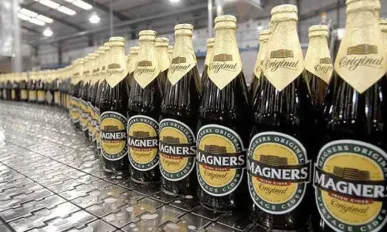C&C Profits From 30% Revenue Rise
Drinks group C&C has reported its fifth consecutive year of earnings growth, and is targeting a mid-single digit operating profit increase in its current financial year. The Dublin-based group — whose chief revenue streams are the Irish cider market and the Scottish lager market, via its Bulmers/Magners and Tennent’s brands, yesterday reported net revenue growth of 30%, to €620.2m for the 12 months to the end of February. Pre-tax profit grew by 6% to €116.2m, while pre-exceptional operating profit (integration costs led to an exceptional charge of nearly €21m) grew by 10.6% to €126.7m. Adjusted diluted earnings per share grew by just under 6% to 29.5c. Growth was mainly driven by the aforementioned Scottish and Irish divisions. In Ireland, C&C’s long alcoholic drinks volumes were up 1.1% and outperformed a flat market. Irish divisional operating profit rose by 9.4% to €43m, with net revenue up by 2.2% at €94.2m. Cider net revenue, alone, was up by nearly 2% in Ireland. While the Magners brand saw a 10% volume decline, C&C said its cider performance in Britain stabilised in the second half of the year. Net revenue in the UK Cider division fell by 15% to €112.8m, with operating profit down by nearly 30% to €20.7m, but Magners performed well and grew its market share in Scotland. Profits, at the group’s international export business, were up by nearly 70%; while management expressed confidence in its cider prospects in the US, despite under-performing the market in the past year.
C&C to Consider Share Buyback this Year
Stephen Glancey, chief executive of Bulmers maker C&C, told analysts it would consider launching a share buyback this year as its share price rose by more than 6 per cent.
Siemens to make Alstom Bid
Germany’s Siemens is currently working on a formal asset-swap offer for power business Alstom that could come to light later this week.
EU Regulators to Decide on Carphone-Dixons Deal by June 25th
European Union antitrust regulators will decide whether to clear the £3.8 billion ($6.40 billion) merger of British mobile phone retailer Carphone Warehouse and Dixons Retail, the European Commission said on Monday.
Coal, Oil and Gas will be gone in Five Years in the UK
The UK government says complete energy independence is unnecessary, but Britain has just 5.2 years of oil, 4.5 years of coal and 3 years of gas remaining.
Dixons and Carphone Warehouse Agree $6.4 Billion Merger
UK company Carphone Warehouse and Dixons Retail have agreed a £3.8 billion proud ($6.38 billion) all-share merger, creating a powerful pan-European mobile phone and electrical group with approximately 2900 stores.
Woman to Command UN Peacekeeping Force for the first time
For the first time, a woman will command a UN peacekeeping force, after Norway’s Major General Kristin Lund was appointed to lead troops in Cyprus.
Light-Sensitive Buildings to Reduce Air Pollution
Improving air quality is a major challenge facing all European countries, both in order to combat climate change as well as to minimise the direct effects of breathing polluted air on human health.
Coca-Cola to Close Two Russian Juice Plants as Market Shrinks
Coca-Cola is closing two of its four fruit juice plants is Russia in response to falling demand in the country, putting at risk hundreds of jobs in a business which the US company had bought for $276 million only four years ago. The company will close the two plants run by its Nidan unit on the 1st June, transferring some of their capacity to the other juice unit, Multon, before the year-end, spokesman Vladimir Kravtsov said. The plants being close are located in Novosibirsk in Siberia and one in the Moscow region. Some of the unit’s 1000 staff will be offered jobs at Multon, Kravtsov says. “The juice market fell by 5 percent last year and the performance of Nidan was worse than the market,” he said, adding the company had been considering the move for some time and made the closure decision at the end of last year. The beverage giant bought Nidan in 2010, which were the fourth-biggest juice maker in Russia at the time. Multon, which it acquired in 2005, has two plants with a combined production capacity of more than 790 million litres a year. The Russian juice market fell by 6 percent year-on year in volume terms in January-September 2013, according to market researchers in Nielsen. In addition to falling market volumes, both Coca-Cola and its rival PepsiCo are faced with increased competition from local Russian brands. The plant closures coincide with an economic slowdown in Russia. The economy is on the brink of recession, having started to shrink in the…
Boosting E-skills in European Higher Education Requires Political will at National Level
With 25% of adults in the European Union lacking the necessary digital skills to effectively use information and communication technologies, according to a report by the Organisation for Economic Cooperation and Development (OECD) published in autumn 2013, the European Commission is facing various challenges in order to bridge the competitive gap with the rest of the world, Euractiv reports. On top of the differences with third countries, broad disparities are found between EU member states themselves, the study showed with countries like Spain, Italy or Poland where almost one adult in five has no computer experience. Age disparities were also detected with high school pupils having sometimes better skills than higher education graduates. From the lack of access to digital equipment in schools and higher education institutions to the lack of access to open education resources and effective e-skills, the European Commission has identified a number of priorities for the coming years through its ‘Opening up Education’ strategy. Digital DivideA study by the Commission on ICT in education also showed dramatic results in EU countries: between 50% and 80% of students never use digital textbooks or exercise software while 70% of teachers are asking for training to improve their digital skills. And while more than 90% of pupils are likely to have internet access at school, the number drops to 45% in Croatia and Greece. In an attempt to reduce the digital divide looming over Europe, commissioners Neelie Kroes in charge of the digital agenda and Androulla Vassiliou, responsible for education, launched the joint long-term initiative…





















